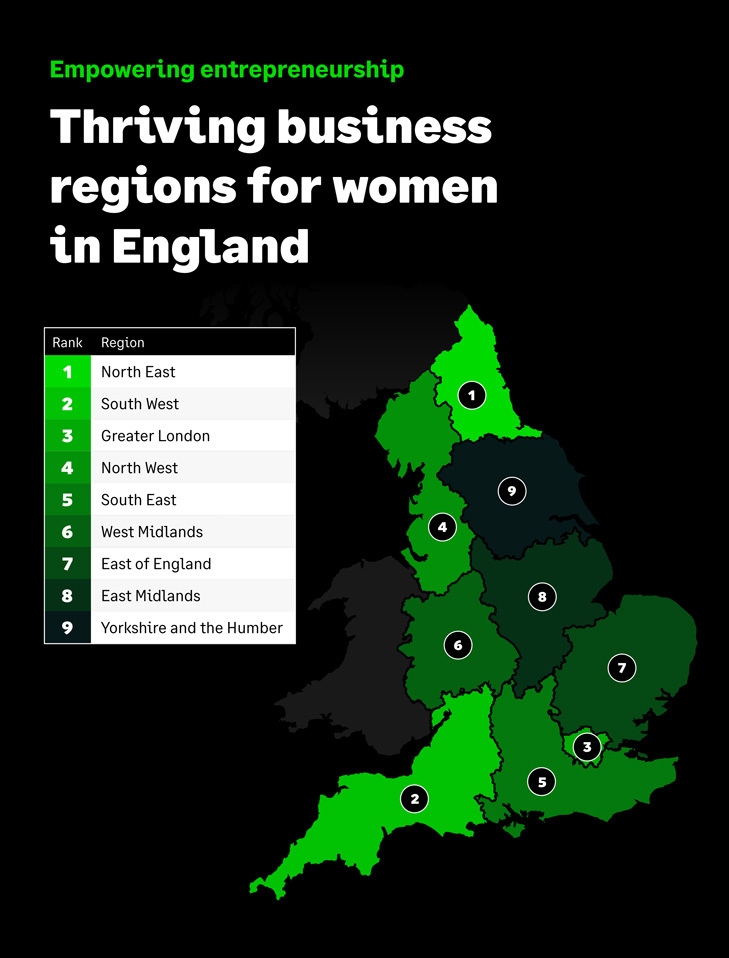The top regions for women starting a business, and how to access resources to help
We reveal where the best regions are for women to start a business across England, and what unique challenges female startups face.

In 2022, women across the country started over 150,000 new companies, more than double the number from 2018, highlighting that this path to entrepreneurship is becoming increasingly explored.
However, the path to success in business is different for everyone, and embarking on a startup journey as a woman can include a range of challenges that demand resilience and determination to overcome.
In this article, we share results from a survey of over 500 business owners across England that asked how supported entrepreneurs felt when starting up, what unique challenges they faced, and how they’d rate their confidence in achieving sustained future success.
Main takeaways from the study
- 32% of women entrepreneurs felt they did not have the required support when starting up compared to 29% of men.
- 27% of women and 23% of men said they were not ready or prepared when starting up.
- When it comes to work-life balance, men report being more successful at managing this (67%) versus 61% of women.
- Twice the number of women (12%) said they did not access any funding resources or options when starting up (versus 6% of men).
- Female entrepreneurs encountered struggles with profitability (77%), work-life balance (72%), becoming environmentally sustainable (65%), minimising costs (71%), managing business finances (74%), understanding tax requirements (75%), and knowing what technology is available to use (69%) more than men said they did.
The beginning of the business journey
People start their own businesses for a multitude of reasons, driven by a diverse array of motivations and aspirations. According to our survey, women are mostly driven by the desire for more flexibility and work life balance (51%), in contrast to male entrepreneurs, with 48% of men starting up a business due to the financial opportunity on offer.
However, when building a business from scratch, support is often crucial, whether that be financial, advisory, educational, or even in terms of networking. Our research showed that male entrepreneurs were slightly more aware of and accessed support more freely than female entrepreneurs, with more men saying they received financial support, support from the government and local councils, support from trade organisations, and support from networking circles (68% vs 66%).
The only area where female entrepreneurs found more support than their male counterparts was where they formed partnerships or collaborations with other businesses or entrepreneurs (13% vs 11%). Indeed, almost a quarter of women say they felt like they could have done with more support or been made aware that more support was available in their local area, with a further 10% stating they did not have the support they required at all.
Knowing that support is available to budding entrepreneurs and using it wherever possible works to benefit businesses everywhere, so we have collated a comprehensive directory of helpful resources you can use when thinking of starting up your own business, including resources specifically for women in business.
Thriving business regions for women
To understand the business landscape of support available, we created an index that looks at the number of businesses started in each region of the country, the success rate of these businesses, the number of female employees, the gender pay gap, and several other factors to reveal the top ranking regions for women-led startups.
The top three regions are made up of the North East, the South West, and Greater London, with the North East ranking highest for how much female entrepreneurs felt supported when starting up (81%) as well as being top for how well they were able to manage work-life balance (69%).
Below is a map of the regions across England ranked based on the numerous categories, followed with a full table detailing each result.

Nurturing business growth
From navigating financial constraints and market uncertainties to overcoming self-doubt, there are many obstacles that dot the path of an entrepreneur’s startup journey as they seek to grow. Our previous research on small and medium sized businesses highlighted many of these barriers, and also explored the green shoots of optimism in the years ahead.
Our study found that 77% of women said becoming profitable was a big challenge for them (versus 71% of men), as was managing work-life balance, being environmentally sustainable, minimisng costs, managing the finances of the business, understanding the tax requirements, and knowing what technology is available and should be used.
These challenges were clearly acknowledged by the entrepreneurs we surveyed, and they were aware that they needed to develop and improve their skills in many of these areas to successfully run their businesses.
From financial management (37%) to stock management (25%), women felt they needed to develop their business skills. Marketing and sales skills, understanding legal requirements, and the skills around leadership and management, operations, and logistics were all found to be skills women felt they needed to improve. However, in areas such as tax requirements, product management, hiring, and people management, women were overall more confident than men and felt they needed less training and development.
A quarter of all business owners said that, with hindsight, when they first started their entrepreneurial journey, they weren’t ready or prepared to do so, which is perhaps highlighted by the array of areas both men and women felt they needed to develop. The vast majority, however, did say that they were ready to startup, with 58% of men and 49% of women believing they had the research and preparation needed to get started.
Embracing the future of business growth
With so much to learn while trying to run a business, it would come as little surprise if work-life balance took a hit for many business owners. However, according to our study, 63% of people said they had successfully managed their work-life balance as entrepreneurs, including 67% of men and 61% of women. Just 11% said they felt they had been unsuccessful in this area, which, while showing there is still some work to be done, reveals how balance is a real priority for those getting started in business and fostering a successful environment.
Perhaps the emergence of new technology such as artificial intelligence (AI) can aid in reducing the burden of certain tasks too. With 68% saying that they either moderately or extensively use technology and digital tools such as accountancy apps or inventory management software, entrepreneurs can streamline business operations, improve productivity, or reach a wider customer base in less time.
Continuing to look to the future, we asked how confident entrepreneurs were in achieving some of their biggest aims and, interestingly, found that female entrepreneurs were in fact the most confident group in a range of major categories.
Their confidence was higher than men’s when it came to becoming more profitable (68% vs 67%), growing brand awareness (67% vs 64%), improving customer satisfaction (74% vs 72%), increasing sales (66% vs 61%), and becoming more environmentally sustainable as a business (61% vs 53%).
Final thoughts
We can see from the survey results how often the extent of various challenges differs between men and women, and it’s important to ensure that those with exciting startup ideas know where to turn for support and advice when building their startup.
Whether it’s their local community, business growth hubs, government, or general networks, be assured there is support and advice out there to help make the most of your new business. Explore our huge range of expert advice and insights on starting a business on our blog, and get in touch for further help.






Ask the author a question or share your advice